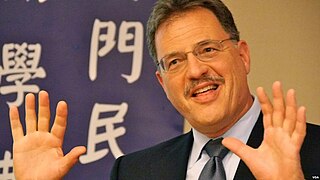Related Research Articles
Good governance is the process of measuring how public institutions conduct public affairs and manage public resources and guarantee the realization of human rights in a manner essentially free of abuse and corruption and with due regard for the rule of law. Governance is "the process of decision-making and the process by which decisions are implemented ". Governance in this context can apply to corporate, international, national, or local governance as well as the interactions between other sectors of society.
In political science, a political system means the type of political organization that can be recognized, observed or otherwise declared by a state.
Governance is the process of making and enforcing decisions within an organization or society. It is the process of interactions through the laws, social norms, power or language as structured in communication of an organized society over a social system. It is done by the government of a state, by a market, or by a network. It is the process of choosing the right course among the actors involved in a collective problem that leads to the creation, reinforcement, or reproduction of acceptable conduct and social order". In lay terms, it could be described as the political processes that exist in and between formal institutions.

A virtual world is a computer-simulated environment which may be populated by many users who can create a personal avatar, and simultaneously and independently explore the virtual world, participate in its activities and communicate with others. These avatars can be textual, graphical representations, or live video avatars with auditory and touch sensations. Virtual worlds are closely related to mirror worlds.

Global governance refers to institutions that coordinate the behavior of transnational actors, facilitate cooperation, resolve disputes, and alleviate collective action problems. Global governance broadly entails making, monitoring, and enforcing rules. Within global governance, a variety of types of actors – not just states – exercise power. Governance is thus broader than government.

Larry Jay Diamond is an American political sociologist and leading contemporary scholar in the field of democracy studies. Diamond is a senior fellow at the Freeman Spogli Institute for International Studies, which is Stanford University's main center for research on international issues. At the Institute Diamond served as the director of the Center on Democracy, Development, and the Rule of Law from 2009-2016. He was succeeded in that role by Francis Fukuyama and then Kathryn Stoner.

Democratic education is a type of formal education that is organized democratically, so that students can manage their own learning and participate in the governance of their school. Democratic education is often specifically emancipatory, with the students' voices being equal to the teacher's.

Jack M. Balkin is an American legal scholar. He is the Knight Professor of Constitutional Law and the First Amendment at Yale Law School. Balkin is the founder and director of the Yale Information Society Project (ISP), a research center whose mission is "to study the implications of the Internet, telecommunications, and the new information technologies for law and society." He also directs the Knight Law and Media Program and the Abrams Institute for Free Expression at Yale Law School.
David Jonathan Andrew Held was a British political scientist who specialised in political theory and international relations. He held a joint appointment as Professor of Politics and International Relations, and was Master of University College, at Durham University until his death. He was also a visiting Professor of Political Science at Libera Università Internazionale degli Studi Sociali Guido Carli. Previously he was the Graham Wallas chair of Political Science and the co-director of the Centre for the Study of Global Governance at the London School of Economics.

The Brennan Center for Justice at New York University School of Law is a nonprofit law and public policy institute. The organization is named after Supreme Court Justice William J. Brennan Jr. Described as liberal, the Brennan Center advocates for a number of progressive public policy positions, including raising the minimum wage, opposing voter ID laws, and calling for public funding of elections. The organization opposed the U.S. Supreme Court's ruling in Citizens United v. FEC, which held that the First Amendment prohibits the government from restricting independent political expenditures by nonprofits.
Cynthia Estlund is the Catherine A. Rein Professor of Law at the New York University School of Law.

Laura DeNardis is an American author and a scholar of Internet governance and technical infrastructure. She is the Professor and Endowed Chair in Technology, Ethics, and Society at Georgetown University. DeNardis is an affiliated Fellow of the Yale Information Society Project at Yale Law School and served as its Executive Director from 2008-2011. She previously served as a Senior Fellow of the Centre for International Governance Innovation (CIGI) and the Director of Research for the Global Commission on Internet Governance. With a background in information technology engineering and a doctorate in Science and Technology Studies (STS), her research studies the social and political implications of Internet technical architecture and governance. Domestically, she served as an appointed member of the U.S. Department of State Advisory Committee on International Communications and Information Policy (ACICIP) during the Obama Administration. She has more than two decades of experience as an expert consultant in Internet Governance to Fortune 500 companies, foundations, and government agencies.

Michael H. Posner is an American lawyer, the Founding Executive Director and later the President of Human Rights First, the former Assistant Secretary of State for Democracy, Human Rights, and Labor (DRL) of the United States, currently director for the Center of Business and Human Rights at NYU Stern School of Business, as well as Professor of Business and Society at New York University Stern School of Business, and a board member of the International Service for Human Rights.

Beth Simone Noveck is New Jersey's first chief innovation officer, at Northeastern University where she directs the Burnes Center for Social Change, the Governance Lab and its MacArthur Research Network on Opening Governance. She is also affiliated faculty with the Institute for Experiential AI. She is the author of Solving Public Problems: How to Fix our Government and Change Our World, Smart Citizens, Smarter State: The Technologies of Expertise and the Future of Government, Wiki Government: How Technology Can Make Government Better, Democracy Stronger, and Citizens More Powerful, and co-editor of the State of Play: Law and Virtual Worlds.

The rule of law is a political ideal that all citizens and institutions within a country, state, or community are accountable to the same laws, including lawmakers and leaders. The term rule of law is closely related to constitutionalism as well as Rechtsstaat. It refers to a political situation, not to any specific legal rule. The rule of law is defined in the Encyclopedia Britannica as "the mechanism, process, institution, practice, or norm that supports the equality of all citizens before the law, secures a nonarbitrary form of government, and more generally prevents the arbitrary use of power."

Designing Virtual Worlds is a book about the practice of virtual world development by Richard Bartle. It has been noted as an authoritative source regarding the history of world-based online games. College courses have been taught using it.

Simon Chesterman is an Australian legal academic and writer who is currently vice-provost at the National University of Singapore (NUS) and dean of the NUS's Faculty of Law and NUS College. He is also a senior director for AI Governance at AI Singapore, editor of the Asian Journal of International Law and co-president of the Law Schools Global League.
A hybrid regime is a type of political system often created as a result of an incomplete democratic transition from an authoritarian regime to a democratic one. Hybrid regimes are categorized as having a combination of autocratic features with democratic ones and can simultaneously hold political repressions and regular elections. Hybrid regimes are commonly found in developing countries with abundant natural resources such as petro-states. Although these regimes experience civil unrest, they may be relatively stable and tenacious for decades at a time. There has been a rise in hybrid regimes since the end of the Cold War.

New York University Abu Dhabi is a degree granting, portal campus of New York University serving as a private, liberal arts college, located in Abu Dhabi, United Arab Emirates.
References
- ↑ New York Law School: State of Play I Linked 2014-08-04
- ↑ New York Law School: State of Play II Linked 2014-08-04
- ↑ New York Law School: State of Play III Linked 2014-08-04
- ↑ New York Law School: State of Play IV Linked 2014-08-04
- ↑ New York Law School: State of Play V Linked 2014-08-04
- ↑ New York Law School: State of Play VI Linked 2014-08-04
- ↑ NYU Press: The State of Play Linked 2014-08-04